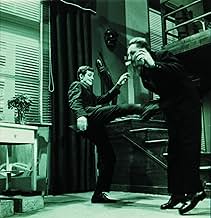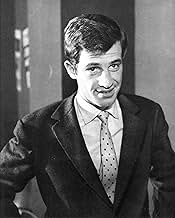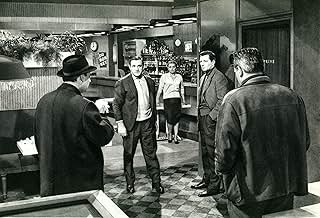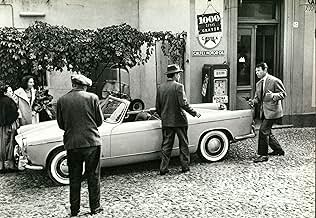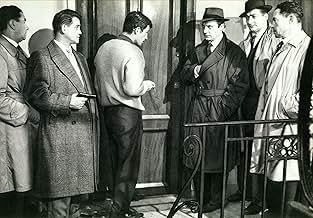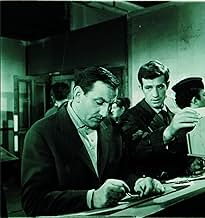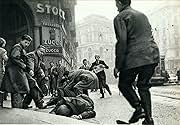IMDb RATING
7.5/10
4.8K
YOUR RATING
A ruthless criminal flees from the pursuit, involving more and more casualties.A ruthless criminal flees from the pursuit, involving more and more casualties.A ruthless criminal flees from the pursuit, involving more and more casualties.
Simone Desmaison
- Thérèse Davos
- (as Simone France)
Jean-Pierre Zola
- Le patron de l'agence privée
- (as J.P. Zola)
Philippe March
- Jean Martin
- (as Aimé de March)
Featured reviews
Classe Tous Risques (The Big Risk) is repeatedly recommended every time I look up a Jean-Pierre Melville film that I had to give it a watch as soon as possible. Since I've been discovering Melville and seemingly working backwards through his filmography, it would be easy for me to mistake this as one of his films, but it was made in 1960, by Claude Sautet, before Melville would come and stake his claim on french neo-noir.
Classe Tous Risques has two of the best lead men of the time, Lino Ventura and Jean-Paul Belmondo. Ventura plays Abel, a gangster exiled in Italy with his wife and two kids, who wants to come back to Paris because the police are closing in on him. After a roaring and fast paced opening with a big surprise, Abel eventually gets hooked up with Eric Stark (Belmondo) who wants to get into the criminal underworld. Stark becomes Abel's chauffeur and eventual only friend in an underworld that turns it's back on Abel after everything he's done and been through. The film shows the the duality of the two men, the older Abel at the end of his time after tragedy strikes him, and the younger Eric starting off the same way Abel did, falling in love with a beautiful woman who sticks with her man despite the world they are a part of. It never ends pretty for them, or their loved ones. Its one thing to see a individual criminal come to his demise, its different when he has loved ones he risks taking down with him.
Much like Melville's film, the seemingly simple story gets more subtlety complicated as it goes along. As usual, as what I feel with Melville's films, it left my head spinning (in a good way) and dying to re watch it again to pick up what I missed the first time. Classe Tous Risques is a definite keeper.
Classe Tous Risques has two of the best lead men of the time, Lino Ventura and Jean-Paul Belmondo. Ventura plays Abel, a gangster exiled in Italy with his wife and two kids, who wants to come back to Paris because the police are closing in on him. After a roaring and fast paced opening with a big surprise, Abel eventually gets hooked up with Eric Stark (Belmondo) who wants to get into the criminal underworld. Stark becomes Abel's chauffeur and eventual only friend in an underworld that turns it's back on Abel after everything he's done and been through. The film shows the the duality of the two men, the older Abel at the end of his time after tragedy strikes him, and the younger Eric starting off the same way Abel did, falling in love with a beautiful woman who sticks with her man despite the world they are a part of. It never ends pretty for them, or their loved ones. Its one thing to see a individual criminal come to his demise, its different when he has loved ones he risks taking down with him.
Much like Melville's film, the seemingly simple story gets more subtlety complicated as it goes along. As usual, as what I feel with Melville's films, it left my head spinning (in a good way) and dying to re watch it again to pick up what I missed the first time. Classe Tous Risques is a definite keeper.
I have just watched on Italian TV the excellent crime drama CLASSE TOUS RISQUES (1960; aka: THE BIG RISK), directed by Claude Sautet and starring the late Lino Ventura (in one of his best roles) and a very young Jean-Paul Belmondo.
This film came out at the tail end of a string of French gangster thrillers of the 50s, the most famous of which was, of course, Jules Dassin's seminal DU RIFIFI CHEZ LES HOMMES (1954; aka: RIFIFI). I haven't watched RIFIFI in a long time but I plan to acquire the Criterion DVD some time or other. In fact, I have only postponed it, really, because of the reported audio-synch problem present on the disc's first pressings and, being a non-U.S. resident, Criterion's policy dictates that no defective discs delivered outside Region 1 territories can be replaced! Still, in light of THE BIG RISK, I may risk it [sic] all the same!
When the film came out it converged with a spate of Nouvelle Vague releases including Jean-Luc Godard's A' BOUT DE SOUFFLE (1960; aka: BREATHLESS) starring, of course, Jean-Paul Belmondo himself. It is easy to assume that his characterization in THE BIG RISK is nowhere near as iconic as his Laszlo Kovacs in Godard's film, but after all his is a supporting role (albeit pulled off with confidence and charm) and he is all too obviously overshadowed by the underrated Ventura, who dominates the film from beginning to end. Ventura was a regular in gangster films of the period: he was in Jacques Becker's masterful TOUCHEZ PAS AU GRISBI (1953; aka: HANDS OFF THE LOOT!) playing the main villainous role and in which he conducts an effective vis-à-vis with nominal star Jean Gabin, but he then took the lead for Jean-Pierre Melville's magnificent thriller set in WWII, L'ARMEE' DES OMBRES (1969; aka: ARMY OF SHADOWS).
Incidentally, next week Criterion will release Melville's BOB LE FLAMBEUR (1955) and I hope they can put their hands on other films by this French master, notably LES ENFANTS TERRIBLES (1950), from the play by Jean Cocteau; LE DEUXIEME SOUFFLE (1966; aka: SECOND BREATH), also starring Lino Ventura; LE SAMOURAI (1967), his undisputed chef d'oeuvre; the aforementioned L'ARMEE' DES OMBRES and LE CERCLE ROUGE (1970; aka: THE RED CIRCLE). It is worth noting that the last two may very well be future Criterion DVDs. For the record, I have recorded ENFANTS, SAMOURAI, ARMEE' and CERCLE (which I have yet to watch) off French TV, along with the atypical LEON MORIN, PRETRE (1961) and the little-seen LE DOULOS (1962; aka: THE FINGER MAN), both of which star Jean-Paul Belmondo.
To go back to THE BIG RISK, it was dismissed at the time as old-fashioned in light of the Nouvelle Vague, though the few stylistic touches it has are effective exactly because they are sparse and unexpected. After an explosive start, the film relaxes its grip for the first half in order to establish plot (somewhat unusual in its emphasis on the domestic problems of gangsters) and characterization (particularly in eliciting audience sympathy for the lone anti-hero). The plot does have its improbable turns: for example, Belmondo's and Sandra Milo's characters are a bit too good to be true, aiding Ventura without batting an eyelid (despite the obvious danger involved) just minutes after making his acquaintance, while the ending is a bit of a letdown (the film is abruptly interrupted and the plot resolved with a hurried voice-over explanation)...but Ventura's solid performance as a man betrayed, quietly desperate at first but driven eventually to sudden eruptions of violence, holds the film firmly together and makes THE BIG RISK a classic of its kind.
Other films by Claude Sautet I have watched are LES CHOSES DE LA VIE (1969), MAX ET LES FERRAILLEURS (1971; aka: MAX AND THE SCRAP-MONGERS), CESAR ET ROSALIE (1972), all on Italian TV, and VINCENT, FRANCOIS, PAUL ET LES AUTRES (1974), which I have recorded off French TV. All of these are low-key yet very interesting and thought-provoking films, aided a great deal by a superb selection of actors (Michel Piccoli in CHOSES, MAX and VINCENT; Romy Schneider in the first three titles; and Yves Montand in the last two). VINCENT, FRANCOIS, PAUL ET LES AUTRES is perhaps Sautet's best film: it co-stars Serge Reggiani, Gerard Depardieu (one of his first), Marie Dubois and Stephane Audran (an extended cameo, really, but effective nonetheless).
As I have said, I wish that some of the films I mentioned by Claude Sautet and Jean-Pierre Melville, including of course THE BIG RISK, will one day be released on DVD. Supplements for such films may be hard to come by, I guess, but a quality print in the Original Aspect Ratio with a transfer to match are the least we could expect for them. I know that some of the above-mentioned films are already available on French Region 2 DVD but unfortunately most of them do not carry English subtitles. Although I do have quite a basic knowledge of the French language, I am still not fluent enough to get by without any subtitles. However, I would very much like to read your opinions of French Region 2 DVDs and will affect a search through the Mobius archives for that purpose, though I may still have to post my queries about particular French DVDs which I am interested in purchasing in a new thread in this Forum in the near future.
This film came out at the tail end of a string of French gangster thrillers of the 50s, the most famous of which was, of course, Jules Dassin's seminal DU RIFIFI CHEZ LES HOMMES (1954; aka: RIFIFI). I haven't watched RIFIFI in a long time but I plan to acquire the Criterion DVD some time or other. In fact, I have only postponed it, really, because of the reported audio-synch problem present on the disc's first pressings and, being a non-U.S. resident, Criterion's policy dictates that no defective discs delivered outside Region 1 territories can be replaced! Still, in light of THE BIG RISK, I may risk it [sic] all the same!
When the film came out it converged with a spate of Nouvelle Vague releases including Jean-Luc Godard's A' BOUT DE SOUFFLE (1960; aka: BREATHLESS) starring, of course, Jean-Paul Belmondo himself. It is easy to assume that his characterization in THE BIG RISK is nowhere near as iconic as his Laszlo Kovacs in Godard's film, but after all his is a supporting role (albeit pulled off with confidence and charm) and he is all too obviously overshadowed by the underrated Ventura, who dominates the film from beginning to end. Ventura was a regular in gangster films of the period: he was in Jacques Becker's masterful TOUCHEZ PAS AU GRISBI (1953; aka: HANDS OFF THE LOOT!) playing the main villainous role and in which he conducts an effective vis-à-vis with nominal star Jean Gabin, but he then took the lead for Jean-Pierre Melville's magnificent thriller set in WWII, L'ARMEE' DES OMBRES (1969; aka: ARMY OF SHADOWS).
Incidentally, next week Criterion will release Melville's BOB LE FLAMBEUR (1955) and I hope they can put their hands on other films by this French master, notably LES ENFANTS TERRIBLES (1950), from the play by Jean Cocteau; LE DEUXIEME SOUFFLE (1966; aka: SECOND BREATH), also starring Lino Ventura; LE SAMOURAI (1967), his undisputed chef d'oeuvre; the aforementioned L'ARMEE' DES OMBRES and LE CERCLE ROUGE (1970; aka: THE RED CIRCLE). It is worth noting that the last two may very well be future Criterion DVDs. For the record, I have recorded ENFANTS, SAMOURAI, ARMEE' and CERCLE (which I have yet to watch) off French TV, along with the atypical LEON MORIN, PRETRE (1961) and the little-seen LE DOULOS (1962; aka: THE FINGER MAN), both of which star Jean-Paul Belmondo.
To go back to THE BIG RISK, it was dismissed at the time as old-fashioned in light of the Nouvelle Vague, though the few stylistic touches it has are effective exactly because they are sparse and unexpected. After an explosive start, the film relaxes its grip for the first half in order to establish plot (somewhat unusual in its emphasis on the domestic problems of gangsters) and characterization (particularly in eliciting audience sympathy for the lone anti-hero). The plot does have its improbable turns: for example, Belmondo's and Sandra Milo's characters are a bit too good to be true, aiding Ventura without batting an eyelid (despite the obvious danger involved) just minutes after making his acquaintance, while the ending is a bit of a letdown (the film is abruptly interrupted and the plot resolved with a hurried voice-over explanation)...but Ventura's solid performance as a man betrayed, quietly desperate at first but driven eventually to sudden eruptions of violence, holds the film firmly together and makes THE BIG RISK a classic of its kind.
Other films by Claude Sautet I have watched are LES CHOSES DE LA VIE (1969), MAX ET LES FERRAILLEURS (1971; aka: MAX AND THE SCRAP-MONGERS), CESAR ET ROSALIE (1972), all on Italian TV, and VINCENT, FRANCOIS, PAUL ET LES AUTRES (1974), which I have recorded off French TV. All of these are low-key yet very interesting and thought-provoking films, aided a great deal by a superb selection of actors (Michel Piccoli in CHOSES, MAX and VINCENT; Romy Schneider in the first three titles; and Yves Montand in the last two). VINCENT, FRANCOIS, PAUL ET LES AUTRES is perhaps Sautet's best film: it co-stars Serge Reggiani, Gerard Depardieu (one of his first), Marie Dubois and Stephane Audran (an extended cameo, really, but effective nonetheless).
As I have said, I wish that some of the films I mentioned by Claude Sautet and Jean-Pierre Melville, including of course THE BIG RISK, will one day be released on DVD. Supplements for such films may be hard to come by, I guess, but a quality print in the Original Aspect Ratio with a transfer to match are the least we could expect for them. I know that some of the above-mentioned films are already available on French Region 2 DVD but unfortunately most of them do not carry English subtitles. Although I do have quite a basic knowledge of the French language, I am still not fluent enough to get by without any subtitles. However, I would very much like to read your opinions of French Region 2 DVDs and will affect a search through the Mobius archives for that purpose, though I may still have to post my queries about particular French DVDs which I am interested in purchasing in a new thread in this Forum in the near future.
10Dziga7
I saw this film at Telluride Film Festival in 1997, where one of the screenwriters, José Giovanni, was being honored. It ranks highly as a great noir-crime-drama, incredible performances by Belmondo and Lino Ventura. The attention given to every character, and complex psychological portrayals, detailing loyalty, treachery, love, and hope, are tremendous. It is an excellent drama, an excellent thriller, and an excellent film. Up there with the best of Melville. (The title in English 'Class all risk,' in French 'Classe tous risques' is word-play on 'Classe Touriste,' meaning 'Tourist Class'.
"Classes tous risques" is one of the best "gangsters" films noirs France has ever produced.Perfect cast :Lino Ventura,a young Jean -Paul Belmondo (who made "a bout de souffle",Godard's thing, the same year),Marcel Dalio and a fine supporting cast ;brilliant script by José Giovanni -who also wrote "le trou" Becker's masterpièce the same year!What a year for him!;wonderful black and white cinematography by Ghislain Cloquet.And taut action,first-class directing by Claude Sautet,who surpasses Jean-Pierre Melville .Whereas the latter films gangsters movie with metaphysical pretensions,which sometimes lasts more than two hours,Claude Sautet directs men of flesh and blood,and the presence of the two children adds moments of extraordinary poignancy which Melville has never been able to generate .And Sautet avoids pathos,excessive sentimentality:the last time Ventura sees his children,coming down in the metro (subway)is a peak of restrained emotion.
Ventura portrays a gangster whose die is cast when the movie begins.He thinks that he can rely on his former acquaintances ,but they are all cowards -we are far from manly friendship dear to Jacques Becker ("touchez pas au grisbi" ) which Melville was to continue throughout the sixties-sometimes abetted by mean women (the film noir misogyny par excellence),living in a rotten microcosm,ready to inform on -we are far from Jean Seberg's simplistic behavior in Godard's "opus"-.
Cloquet works wonders with the picture:the scene on the beach in a starless night when the two children see their mother die after the shoot-out with the customs officers is absolutely mind-boggling.
There's a good use of voice-over,which Sautet only uses when necessary;thus ,the last lines make the ending even stronger than if we have attended the scenes.
Claude Sautet had found a good niche ,and he followed the "classes tous risques" rules quite well with his follow-up "l'arme à gauche" (1965) which featured Ventura again and made a good use of a desert island and a ship.Had he continued in that vein,France would have had a Howard Hawks.In his subsequent works ,only "Max et les ferrailleurs " (1971) showed something of the brilliance he displayed in the first half of the sixties.He had become ,from "les choses de la vie" onwards,the cinema de qualité director who used to focus on tender-hearted bourgeois in such works as "Cesar et Rosalie" (1972),"Vincent François ,Paul et les autres" (1974) or "Mado" (1976)
Ventura portrays a gangster whose die is cast when the movie begins.He thinks that he can rely on his former acquaintances ,but they are all cowards -we are far from manly friendship dear to Jacques Becker ("touchez pas au grisbi" ) which Melville was to continue throughout the sixties-sometimes abetted by mean women (the film noir misogyny par excellence),living in a rotten microcosm,ready to inform on -we are far from Jean Seberg's simplistic behavior in Godard's "opus"-.
Cloquet works wonders with the picture:the scene on the beach in a starless night when the two children see their mother die after the shoot-out with the customs officers is absolutely mind-boggling.
There's a good use of voice-over,which Sautet only uses when necessary;thus ,the last lines make the ending even stronger than if we have attended the scenes.
Claude Sautet had found a good niche ,and he followed the "classes tous risques" rules quite well with his follow-up "l'arme à gauche" (1965) which featured Ventura again and made a good use of a desert island and a ship.Had he continued in that vein,France would have had a Howard Hawks.In his subsequent works ,only "Max et les ferrailleurs " (1971) showed something of the brilliance he displayed in the first half of the sixties.He had become ,from "les choses de la vie" onwards,the cinema de qualité director who used to focus on tender-hearted bourgeois in such works as "Cesar et Rosalie" (1972),"Vincent François ,Paul et les autres" (1974) or "Mado" (1976)
A discovery. Made in 1960, at the peak of the French New Wave, 'Classe Tous Risques' is a classic gangsters movie, directed by Claude Sautet, the screen adaptation of a novel by José Giovanni. Like many other filmmakers who began their careers during the New French Wave, Sautet and Giovanni, even though they did not belong to the current, became known both as directors and screenwriters of many films of this genre, a genre which a few years later will draw the attention of some of the most famous directors of the New Wave such as Melville or Chabrol. The film brings together on the same screen two of the actors specializing in tough guys roles in French films noir. Lino Ventura was already a well-known actor, while Jean-Paul Belmondo was building up his fame and full of creative hunger. In that year 1960 his name appeared on the credits of no less than eight films. The presence of Ventura and Belmondo, who on the screen as in reality played the roles of master and disciple is just one of the arguments that make 'Classe Tous Risques' a film worth seeing 60 years after its premiere.
Many films had already been made about the 'code of honor' of the underworld, and more would follow. Let's put aside the moral judgments about the 'honor' of those who rob, kill each other or kill innocent people in cold blood, but otherwise they are good familist and people capable of falling in love. Let's admit that the theme is an excellent starting point or core subject for thriller novels and films noir. This is also the case with the story of gangster Abel Davos (Lino Ventura), sentenced to death and pursued by all police of Europe, whose wife is killed when they try to return to France, who is betrayed by his old friends in crime and thus left to fight for survival with his two 8- and 4-year-old boys in her care. The help comes from Eric Stark (Jean-Paul Belmondo), a young gangster in the making, for whom Davos was kind of a moral model, precisely because of his respect for the mob codes of honor. The connection between the two (friendship, master - disciple) is the axis of the film.
Lino Ventura acts wonderfully in a type of role in which he specialized in those years, the tough guy followed by everyone who carries a gun, and whose chances of surviving until 'Fin' appears on the screen are low. He is however surpassed, I believe, in this film by Jean-Paul Belmondo, who manages to give a positive touch to his role, with the help of Sandra Milo as the young actress with whom Eric begins a relationship that may be his chance not to repeat the fate of Abel . The filming has rhythm and fluency, the characters are believable and the action flows interestingly until the final part, which confronts us with a less common ending for films of this genre, perhaps inspired by docu-novels that were also in vogue in those years. It's worth, I think, to see the movie and get to the end to judge by yourselves.
Many films had already been made about the 'code of honor' of the underworld, and more would follow. Let's put aside the moral judgments about the 'honor' of those who rob, kill each other or kill innocent people in cold blood, but otherwise they are good familist and people capable of falling in love. Let's admit that the theme is an excellent starting point or core subject for thriller novels and films noir. This is also the case with the story of gangster Abel Davos (Lino Ventura), sentenced to death and pursued by all police of Europe, whose wife is killed when they try to return to France, who is betrayed by his old friends in crime and thus left to fight for survival with his two 8- and 4-year-old boys in her care. The help comes from Eric Stark (Jean-Paul Belmondo), a young gangster in the making, for whom Davos was kind of a moral model, precisely because of his respect for the mob codes of honor. The connection between the two (friendship, master - disciple) is the axis of the film.
Lino Ventura acts wonderfully in a type of role in which he specialized in those years, the tough guy followed by everyone who carries a gun, and whose chances of surviving until 'Fin' appears on the screen are low. He is however surpassed, I believe, in this film by Jean-Paul Belmondo, who manages to give a positive touch to his role, with the help of Sandra Milo as the young actress with whom Eric begins a relationship that may be his chance not to repeat the fate of Abel . The filming has rhythm and fluency, the characters are believable and the action flows interestingly until the final part, which confronts us with a less common ending for films of this genre, perhaps inspired by docu-novels that were also in vogue in those years. It's worth, I think, to see the movie and get to the end to judge by yourselves.
Did you know
- TriviaCo-writer/Director Claude Sautet said after the shooting that he did not know that the Abel Davos - Danos - character was inspired by a gangster who collaborated with the Nazis against French resistance and Jews during German occupation.
- Quotes
Eric Stark: The best thing about me is my left hook.
- ConnectionsFeatured in Claude Sautet ou La magie invisible (2003)
- How long is The Big Risk?Powered by Alexa
Details
Box office
- Gross US & Canada
- $132,928
- Opening weekend US & Canada
- $11,945
- Nov 20, 2005
- Gross worldwide
- $132,928
- Runtime
- 1h 43m(103 min)
- Color
- Aspect ratio
- 1.66 : 1
Contribute to this page
Suggest an edit or add missing content




